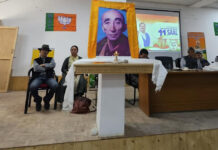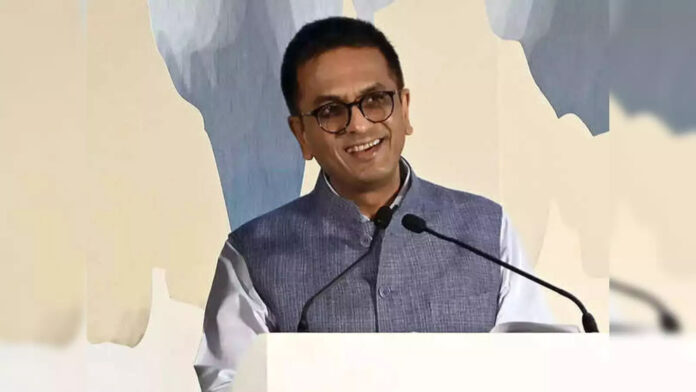NEW DELHI, Mar 21
THE CENTRE on Wednesday defended the selection of the two new election commissioners by a committee that excluded the Chief Justice of India, saying the independence of the Election Commission “does not arise from” the presence of a judicial member in the selection committee. “To indicate… that selection committees without judicial members would invariably be biased is wholly incorrect,” it said. Responding to the SC’s notice on a plea filed by the Association for Democratic Reforms (ADR) which challenged the appointments, the Ministry of Law and Justice, in an affidavit on Wednesday, also denied that the meeting of the selection committee was advanced to pre-empt a hearing in the Supreme Court the next day. Supporting The Chief Election Commissioner and other Election Commissioners (Appointment, Conditions of Service and Terms of Office) Act, 2023, which provides for a selection committee comprising the Prime Minister, Leader of Opposition in Lok Sabha, and a Union Cabinet Minister, the ministry said: “The independence of the EC, or any other organisation or authority, does not arise from, and is not attributable to, the presence of a judicial member in the selection committee… Equally, the presence of senior government functionaries on the selection committee cannot in, and of, itself be a ground to automatically assume bias on behalf of the committee.” On the NGO’s claim that the selection committee meeting was preponed to March 14, to “pre-empt” the SC’s order the next day, when the matters challenging the 2023 law were listed for hearing on interim relief, the government said the meeting had been rescheduled on March 9 itself in view of Arun Goel’s resignation. There was “no attempt whatsoever to pre-empt the judicial process in any manner whatsoever,” it said.
Retired IAS officers Gyanesh Kumar and Sukhbir Singh Sandhu were appointed as election commissioners on March 14, hours after their selection by a three-member committee of Prime Minister Narendra Modi, Union Home Minister Amit Shah and Leader of Congress in Lok Sabha Adhir Ranjan Chowdhury. Chowdhury had recorded his dissent, saying he got the names of six shortlisted officers only minutes before the meeting. Raising this in its plea, ADR said this reflected “premeditation on the minds of the two members of the Executive with regard to the names of those who would be appointed to the post.” In its affidavit, the government said Chowdhury was handed a list of candidates under consideration on March 13, but the shortlist could not be provided as the search committee had not completed its process. The search committee shortlisted the names only on March 14, after which it was provided to the selection committee, it said. “The procedure prescribed by law has been fully followed. The list of shortlisted persons was made available to the leader of the single largest party in Opposition as soon as practicable, after the search committee finalised six names,” it said. “The credentials of the persons finally appointed to the post of Election Commissioner have at no point been called into question… (and) no objection whatsoever has been raised about the fitness, eligibility or competence… Instead, a political controversy is sought to be created only on the basis of bare, unsupported and pernicious statements about certain vague and unspecified motives behind the appointment,” the government said.
“The case of the petitioners is premised on one fundamental fallacy that the independence can only be maintained in any authority when the selection committee is of a particular formulation,” it said. Saying that “the high constitutional functionaries ought to be presumed to act fairly and in good faith”, it said that “to indicate, as the petitioners suggest, that selection committees without judicial members would invariably be biased is wholly incorrect”. The new law on appointment of the CEC and ECs was enacted after the SC’s direction, on March 2, 2023, in the Anoop Baranwal vs Union of India case, to include the CJI in the committee. The government on Wednesday underlined that the SC had only provided a “stop gap” arrangement, until the Parliament stepped in. “Where the Constitution itself specifically vests Parliament with the power to decide upon the appointments of the Election Commissioner, and Parliament exercises this power, no question of Executive overruling” can arise, it said. “The (SC) judgment… had been conscious of the fact that the ultimate decision making power in this regard lay with Parliament and so it had consciously evolved a time-limited mechanism for appointments to the EC. This mechanism was to last only till the time that Parliament made a law on the subject,” it said.
The Centre contended that the 2023 law was “a significant improvement on the status quo existing and provides for a far more democratic, collaborative and inclusive exercise for appointment of Election Commissioners in line with the spirit of the judgment…”
The ministry said that with the term of the 17th Lok Sabha set to expire on June 16, 2024, it was mandatory to constitute the 18th Lok Sabha before that. Saying it was “imperative” that the poll dates were announced in time, it said that after Goel’s resignation, it “would have been humanly not possible for one CEC to discharge his functions alone”.



























